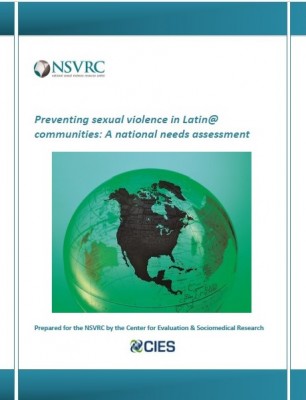Resources Library: Population-Specific Response
Start a Search:
Power and Control Wheel: Immigrant Women
The Power and Control Wheel for Immigrants is a resource prduced by the National Center on Domestic and Sexual Violence (www.ncadv.org) and provides definitions and examples of coercive and abusive behaviors that may be used by perpetrators of violence against immigrants. The wheel can be used as a training tool for advocates and service providers, as well as a supportive and enlightening resource for survivors.
Power and Control Wheel: People with Disabilities and Their Care-givers
"Caregivers are called different things in different contexts. Caregivers, aides, personal assistants, attendants, staff, etc. Sometimes they also have more specific titles like LNA for Licensed Nursing Assistant. Regardless of how any of these terms are used outside of the disability world, every single one of them, in the context of disability, refers to someone with incredible amounts of power over disabled people."
The Power and Control Wheel is a tool that helps explain the different ways an abusive partner can use power and control to manipulate a relationship. This wheel, produced and distributed by the National Center on Domestic and Sexual Violence, highlights the ways in which caregivers can exert control over those in their care.
Preventing Sexual Violence in Latin@ Communities: A National Needs Assessment

A significant proportion of people living in the United States are of Latin@ origin – about 16%, or 50.5 million, as of 2010 (U.S. Census Bureau, 2011). But the few existing studies on sexual violence against Latin@s have shown a lack of culturally relevant services for Latin@ survivors to be a substantial need. One in six Latina women report sexual victimization in their lifetime (Cuevas & Sabina, 2010). Latin@s encounter more barriers to seeking services than non-Latin@s, especially if they are immigrants (Ingram, 2007). Latin@s are also less likely to report rape victimization (Tjaden & Thoennes, 2000).
Therefore, the purpose of this needs assessment was to guage the following:
1. Who are the key groups/organizations engaging in and/or supporting sexual violence prevention and intervention in Latin@ and/or Spanish-speaking communities?
2. What are the resource needs of advocates, counselors, and other professionals in the field engaging in sexual violence prevention and intervention in Latin@ and/or Spanish-speaking communities?
3. What is the cultural competency and Spanish-language capacity of programs and organizations to serve Latin@ and/or Spanish-speaking communities?
4. What is the most effective role of the NSVRC in supporting advocates working with Latin@ and/or Spanish-speaking communities?
Principales hallazgos de estudio “La victimización mediante violencia sexual y sus asociaciones con la salud en una muestra comunitaria de mujeres hispanas”
Esta traducción resume los principales hallazgos del estudio “La victimización de Violencia Sexual y de las asociaciones de la salud en una muestra de la comunidad de las mujeres hispanas,” realizado por K. C. Basile, S.G. Smith, M.L. Walters, D.N. Fowler, K. Hawk y M.E. Hamburger. Los hallazgos del estudio se basan en nuestra comprensión de los efectos de la violencia sexual en mujeres latinas y pueden orientar nuestras estrategias tanto de prevención de la violencia sexual como de respuesta a ésta.
En Ingles: Sexual violence can result in many health, economic, and social struggles in the lives of survivors. This resource highlights findings from a 2015 study on sexual violence against Latina women. Findings can help strengthen our prevention and response strategies with Latin@ communities.
Q&A for Advocates and Attorneys Serving Immigrant Survivors of Gender-based Violence
Who is this document for?
This is a Question and Answer (Q&A) for domestic violence and sexual assault (DV/SA) victim advocates and attorneys who are serving immigrant survivors of gender-based violence, both undocumented survivors and survivors who may be eligible for VAWA self-petitions, U visas, T visas or applying for gender-based asylum. Keep in mind that this information may change as we learn more about the plans of the incoming administration. This document is not legal advice or authority, but rather, it is for informational purposes only, not for media distribution.
Why is this important for survivor safety?
President-elect Trump pledged to make several sweeping changes to immigration policy within his first 100 days. Several of those changes are related to the potential termination of the Deferred Action for Childhood Arrivals (DACA) program and increased enforcement and stricter penalties for those with criminal records and those who re-enter after a previous removal order. As of right now, we do not know whether the incoming administration will be specifically looking to make changes to survivor-based immigration relief. Nonetheless, staying informed about the national and local law enforcement policies and practices is essential to safety planning with survivors of gender-based violence (domestic violence, sexual assault, trafficking). If you are a victim service provider who works with immigrants and want more information about local law enforcement immigration policies and practices, please contact the Domestic and Sexual Violence Coalitions in your state.
Read and download the English Q&A document here.
Read and download the Spanish Q&A document here.
Questions this document answers:
This document was prepared by Americans for Immigrant Justice, Asian Pacific Institute on Gender-Based Violence, ASISTA Immigration Assistance, Casa de Esperanza: National Latin@ Network; Center for Gender & Refugee Studies, Freedom Network USA, Immigrant Legal Resource Center, Immigration Center for Women and Children (ICWC), Julie Marzouk Assistant Clinical Professor, Dale E. Fowler School of Law at Chapman University, Minnesota Coalition for Battered Women, National Immigrant Justice Center, Tahirih Justice Center, We Belong Together.

